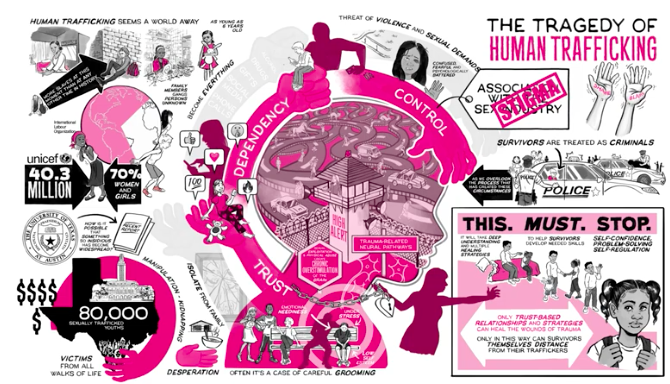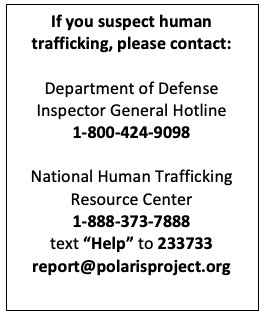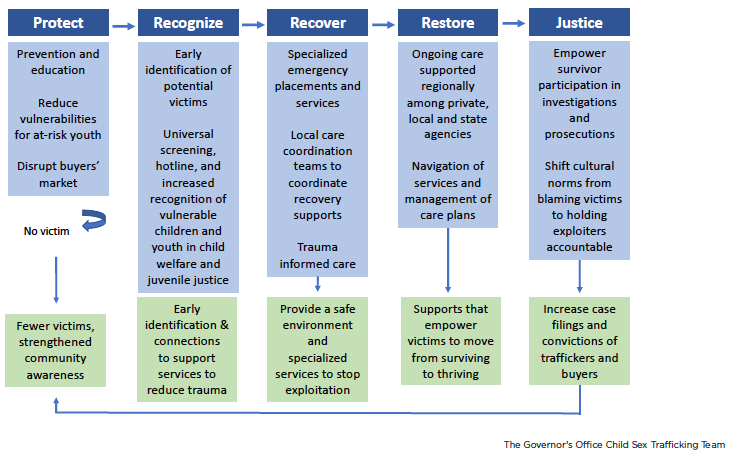Why Home Mentoring is Key to Child Abuse Prevention By Ona Foster, CEO of Family Compass [In…
January is National Human Trafficking Prevention Month
“This is what the Lord says: Do what is just and right. Rescue from the hand of the oppressor the one who has been robbed. Do no wrong or violence to the foreigner, the fatherless or the widow, and do not shed innocent blood in this place.” – Jeremiah 22:3
In 2018 President Donald Trump proclaimed January as National Slavery and Human Trafficking Prevention Month in an effort to raise awareness and end modern day slavery and human trafficking. Through the creation of the Human Exploitation Rescue Operative Child-Rescue Corps (The HERO Child-Rescue Corps), a number of agencies such as the U.S. Department of Defense, U.S. Department of Homeland Security, U.S. Immigration and Customs Enforcement, and the U.S. Special Operations Command, are working together to combat human trafficking within and across the U.S. borders.
According to the Department of Defense, human trafficking is a crime in which force, fraud or coercion is used to compel a person to perform labor, services or commercial sex. It affects all populations: adults, children, men, women, foreign nationals and U.S. citizens, and all economic classes.

Graphic taken from a three-minute animation video produced by Texas Christian University that accurately, succinctly, and artfully describes the realities of child sexual exploitation and how to help survivors heal (video available on the Governor Greg Abbott’s Child Sex Trafficking Team website).
The Rees-Jones Foundation is working to end bonded labor and other forms of slavery by partnering with nonprofits locally and abroad. Further, the Foundation seeks to provide survivors of these hideous crimes with the necessary therapeutic and rehabilitative services to heal and begin a new life.
It Happens in Texas
 Texas ranks second highest in the number of calls to the National Human Trafficking Hotline, while access to specialized, mental health services for trauma-exposed, trafficked and exploited children remains limited within the juvenile justice and foster care systems.
Texas ranks second highest in the number of calls to the National Human Trafficking Hotline, while access to specialized, mental health services for trauma-exposed, trafficked and exploited children remains limited within the juvenile justice and foster care systems.
Reliable prevalence statistics for human trafficking are difficult to identify, but a recent study by The University of Texas at Austin suggests that there are approximately 80,000 sexually trafficked youth in Texas alone. In 2017, it was estimated that 19,000 youth victims of sex trafficking were located in the DFW metroplex. Further a 2011 study by The Schapiro Group found that up to 400 minors are being marketed for sex in Dallas on any given night.
To combat child sex trafficking in Texas, the Child Sex Trafficking Team, a division within the Governor’s Public Safety Office, was created by the 84th Texas Legislative Session in 2015. Its mission is to protect children and youth from sexual exploitation, recognize potential victims, recover victims, support healing, and bring justice.
To ensure that survivors are treated not as perpetrators but with trauma-informed care, the Child Sex Trafficking Team (CSTT) is building the capacity and expertise of existing child protection, juvenile justice, criminal justice, and healthcare systems to improve existing responses to exploited youth. CSTT is also developing new services in the recovery of victims: drop-in centers, emergency shelters, juvenile justice-based counseling and case management programs, and Commercially Sexually Exploited Youth (CSEY) advocacy programs that provide crisis intervention, ongoing case management, and healthy, supportive relationships that help survivors heal and thrive.
Working with a number of subject matter experts, including the Child Sex Trafficking Team, the Meadows Mental Health Policy Institute produced a document titled Road Map for Texas Communities to Address Child Sex Trafficking, which seeks to “help communities around the state prevent and effectively address child sex trafficking”.
Victimization & Recovery
When a child sex trafficking victim is recovered, at the time, it may not feel like a rescue to the victim. The victim might view “the rescue” as an unwelcome, forced separation from his or her family, gang, significant other, father figure, protector, or some combination thereof depending on how the victim has come to view his or her traffickers.

The Stages of Change is a framework designed to help service providers anticipate and properly respond to behavior and mindset changes experienced by a child recovering from sex trafficking (Graphic from the Meadows Mental Health Policy Institute’s Road Map).
It takes a complex model of care to house and rehabilitate these youth who are usually not part of the Child Protective Services system, and therefore, do not have access to the same services or level of care.
However, there are a number of nonprofits in North Texas that are providing these survivors with the necessary therapeutic tools and interventions in an effort to help these children heal and decrease the recidivism rate[1]. In addition to these, the Foundation also supports several nonprofits that operate outside of the U.S. with the goal of preventing individuals from entering the human trafficking network, rescuing those already enslaved, and prosecuting those who perpetuate this hideous crime.
A complete list of resources and organizations that work with the Child Sex Trafficking Team in all fix silos (Protect, Recognize, Recover, Restore, and Justice) can be found on the CSTT website. The two organizations below, Jonathan’s Place and New Friends New Life, are both part of the CSTT network in North Texas, and are organizations that The Rees-Jones Foundation has supported through its grant making.
Jonathan’s Place
The mission of Jonathan’s Place is to provide safe, loving homes and promising futures for abused and neglected children, teens, and young adults.
Youth who experience adverse childhood experiences such as sexual abuse, homelessness and/or entry into the foster care system have the highest rates of susceptibility of being recruited into trafficking. Without a continuum of care including comprehensive wraparound services to meet the unique needs of the commercially sexually exploited children in the community, these individuals will struggle with an array of serious and persistent mental illnesses, substance abuse/addiction and/or various physical health conditions.
Through the Jonathan’s Place new RESET program, these youth have an opportunity for a safe place, loving homes, and promising futures. The Restoring and Educating Survivors to Empowerment and Transformation program, or RESET, began in 2019 through a state grant from the Texas Child Sex Trafficking Team. The goal of RESET is to address the therapeutic needs of the child while preparing him or her to maintain a lifestyle free from trafficking and exploitation.
The RESET programs include a 90-day emergency shelter (for girls ages 5-18) as well as long-term therapeutic foster home placement opportunities (for boys and girls up to age 18). Both programs provide victims with crisis intervention, housing/food/basic needs, therapeutic programming and activities (including an Individual Service Plan), behavioral therapy, and after-care.
Upon entering the RESET program, youth are screened to determine the level of care and types of services he or she requires. Jonathan’s Place is able to provide these victims with trauma-informed group and individual therapy, 24-hour supervision, schooling with the goal of earning a high school diploma or GED, case management, parental or guardian relationship building, support in obtaining legal documents such as a license or social security card, and fun outings.
New Friends New Life
The mission of New Friends New Life is to restore and empower formerly trafficked and sexually exploited women, teen girls, and their children.
Child sex-trafficking victims experience psychological manipulation, assault, and trauma that is distinct and different from the experience of individuals that are victimized by domestic violence, sexual assault, dating violence, and stalking.
The Child Exploitation/High-Risk Victims & Trafficking Unit of the Dallas Police Department is the primary responder for these victims in Dallas, and while there is a community response in place for a child abused by a family member (i.e., Child Protective Services, the Department of Family and Protective Services, CASA, child advocacy centers, etc.), law enforcement has few options for trafficked youth. Once a child is “rescued” by DPD, the officer must decide whether to return the child to his or her home, place the child in a detention facility, or, if the child was abused by a family member, involve Child Protective Services. However, it’s worth noting that CPS does not typically get involved in non-familial abuse cases.
Due to the lack of infrastructure to handle sex trafficking cases, victims often only receive therapeutic services if they are charged with civil misdemeanor offenses such as truancy, failure to identify or runaway status. However, once charged, the services that become available for rehabilitation are often disjointed and do not meet the unique needs of sex trafficking victims. This failure to provide adequate services causes many victims to fall through the cracks and oftentimes leads to these children returning to a life of sexual exploitation.
The New Friends New Life Youth Resource Center seeks to correct the justice system’s response to child victims of sex trafficking in Dallas. At the resource center, victims receive evidence-based therapy, case management, and additional services aimed at helping these children find purpose, and stay active and safe from exploitation. The resource center environment is designed to foster sustainable recovery and deter recidivism.
New Friends New Life serves sexually-exploited children[2], sex-trafficked minors[3], and minors who are vulnerable to being trafficked by circumstances including poverty, homelessness, childhood abuse, and more.
The New Friends New Life Youth Resource Center serves as the go-to resource for high-risk Dallas youth, and has served 230 youth since opening in 2018.
Foundation Involvement
Ending human trafficking in Texas (and better yet, in the world), feels like an impossible task – much like David and Goliath. But David said as he stood before Goliath, “You come against me with your sword and spear and javelin, but I come against you in the name of the Lord Almighty” (1 Samuel 17:45).
There are thousands of children and youth throughout Texas that are in desperate need of rescue and recovery from the Goliath of human trafficking. The Foundation is working to arm the Davids – organizations like Jonathan’s Place and New Friends New Life, which seek to help children and youth begin the healing process.
In addition to supporting domestic organizations like Jonathan’s Place and New Friends New Life, The Rees-Jones Foundation also supports organizations that are working internationally to rescue individuals trapped in bonded or slave labor, provide those individuals with therapeutic services and prosecute perpetrators of this hideous crime. See the Defending the Oppressed: Jan and Trevor Rees-Jones blog for more on the Foundation’s international work fighting human trafficking in India.
[1] National research indicates that a girl who has experienced childhood sexual abuse is five times more likely to recidivate than a male peer.
[2] Sexually-exploited children are preyed upon due to their vulnerability and are more easily manipulated to exchange sex for anything of value i.e., housing, food, clothing, money, etc. A common example of this is when a man offers a homeless, 15-year-old girl a bed for the night if she agrees to be his “girlfriend” for the evening and have sex with him.
[3] A minor that has been sex-trafficked domestically is someone who has been victimized by a third-party trafficker that benefits from selling the child for sex. An example of this is when a trafficker approaches a vulnerable girl in the local foster care system and manipulates her into having sex to generate a profit for him.
Share this post:
Category: Original Content
April is Child Abuse Prevention Month: We Need to Go Upstream By Shellie Velasco, Program Officer [In…
Measuring Impact: Where Data Meets Storytelling By Adrian Cook, Director of Research & Evaluation “Know well the…


